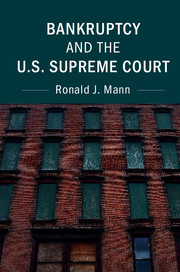Book contents
- Frontmatter
- Contents
- List of Figures
- List of Tables
- Preface
- Introduction
- PART I SETTING THE STAGE
- PART II THE HARD CASES
- SECTION A MISSED OPPORTUNITIES: CONGRESS, THE COURT, AND THE BANKRUPTCY CLAUSE
- SECTION B INTERPRETIVE STRATEGY: THE COURT, THE SOLICITOR GENERAL, AND THE CODE
- 7 Bankruptcy versus Labor Law: Bildisco
- 8 Bankruptcy versus Environmental Law: MidLantic
- 9 Bankruptcy versus Criminal Law: Kelly
- 10 Setting Text against Tradition: Ron Pair
- 11 Bankruptcy and State Sovereignty: BFP
- PART III AMICI AND THE COURT
- PART IV CONCLUSION
11 - Bankruptcy and State Sovereignty: BFP
from SECTION B - INTERPRETIVE STRATEGY: THE COURT, THE SOLICITOR GENERAL, AND THE CODE
Published online by Cambridge University Press: 04 May 2017
- Frontmatter
- Contents
- List of Figures
- List of Tables
- Preface
- Introduction
- PART I SETTING THE STAGE
- PART II THE HARD CASES
- SECTION A MISSED OPPORTUNITIES: CONGRESS, THE COURT, AND THE BANKRUPTCY CLAUSE
- SECTION B INTERPRETIVE STRATEGY: THE COURT, THE SOLICITOR GENERAL, AND THE CODE
- 7 Bankruptcy versus Labor Law: Bildisco
- 8 Bankruptcy versus Environmental Law: MidLantic
- 9 Bankruptcy versus Criminal Law: Kelly
- 10 Setting Text against Tradition: Ron Pair
- 11 Bankruptcy and State Sovereignty: BFP
- PART III AMICI AND THE COURT
- PART IV CONCLUSION
Summary
Our last case presents a paradigmatic example of our thesis in action. BFP v. Resolution Trust Corporation pitted relatively plain statutory language supporting the debtor-in-possession against policy interests supporting a secured creditor. Following upon Ron Pair, an important explanation for the Court's decision to favor policy over the language of the statute was its perception of a need to protect the availability of non-bankruptcy remedies for secured creditors. Parallel to that argument, we see here the Solicitor General appearing (as is so often the case) in support of the secured creditors, successfully arguing to limit the effects of bankruptcy on the rights of secured creditors.
INTRODUCTION
Speculators borrow money to purchase a house in Newport Beach, California. They make no down payment and fail to make any of the mortgage payments. After a few months, the lender, a local savings and loan association, forecloses, selling the house at auction for well under the purchase price (though more than the mortgage). The borrowers then file for bankruptcy, and, in the bankruptcy proceeding, try to invalidate the foreclosure sale as a fraudulent transfer, arguing that the house was worth substantially more than the sales price. A typical enough story, though perhaps a surprise that it occurred more than twenty years ago.
After the lower courts dismissed the borrowers’ claim, the Supreme Court granted certiorari to resolve a circuit conflict. Following full briefing and argument, the Court held that a bankruptcy court does not have the power to overturn a real property foreclosure that is properly conducted under state law. The case involved interpretation of Section 548 of the Bankruptcy Code, which permits a bankruptcy trustee (or debtor-in-possession) to avoid certain transfers of property if the debtor “received less than a reasonably equivalent value in exchange for such transfer.” Thus, the legal question in BFP was whether the consideration received in a foreclosure sale constitutes “reasonably equivalent value” as a matter of law, without respect to the relation between that amount and the ordinary fair market value. I represented the Resolution Trust Corporation in the Supreme Court, arguing that bankruptcy courts should not have the power to second guess the bidding that takes place at regularly conducted and non-collusive foreclosure sales without clearer language to that effect in the Bankruptcy Code.
- Type
- Chapter
- Information
- Bankruptcy and the U.S. Supreme Court , pp. 174 - 192Publisher: Cambridge University PressPrint publication year: 2017



